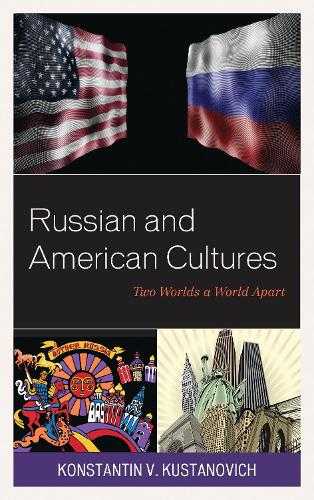
Russian and American Cultures: Two Worlds a World Apart
(Paperback)
Available Formats
Publishing Details
Russian and American Cultures: Two Worlds a World Apart
By (Author) Konstantin V. Kustanovich
Bloomsbury Publishing PLC
Lexington Books
10th July 2020
United States
Classifications
Professional and Scholarly
Non Fiction
Social, group or collective psychology
Social and cultural anthropology
306.0947
Physical Properties
Paperback
228
Width 153mm, Height 218mm, Spine 18mm
358g
Description
Russia is a great countryboth in terms of size and its achievements. It is the largest country in the world and, perhaps, the richest one as well, if one counts all its natural resources combined. The Russian population is well educated and its sciences and technology are quite advanced. It is also a country with political, legal, and economic systems similar to those in Western Europe and North America. What then prevents it from joining the community of Western democratic societies What makes it always slide back into the habitual mode of authoritarianism, nationalism, and permeating corruption even when formal democratic institutions and structures are installed Why does it stubbornly resist any attempts to promote democracy and liberalism Is it because some curse hangs over the country and it always ends up in the hands of a bad government The author of this book is convinced that the Russian government is just a derivative of the entire populationthe entire culture.
The book is thus devoted to Russian culture in comparison with Western cultures and the United States in particular. The author begins this juxtaposition at the dawn of Russian historythe Christianization of Russia in the late tenth century. Religion played a tremendous role in shaping Russian tradition from the tenth through the seventeenth centuries. Choosing Greek Orthodoxy Russia made the first and decisive step away from Western Christianity inheriting the Byzantine kind of authoritarianism and banning not only the religious doctrine but also all knowledge coming from the West including Latin. The author also demonstrates how serfdom and the agricultural commune, which lasted virtually into the twentieth century, fostered the culture of collectivism, nationalism, and legal nihilism. The books last part explores the psychology of Russian perceptions of the United Statesa crucial factor in the relationships between the two countries. Russian culture, the author contends, persists due to inculcating children during the early childhood socialization, thus passing values and myths from generation to generation.
This book represents a truly interdisciplinary project employing ideas and research results from such disciplines as cultural and psychological anthropology, social psychology, psychology of child development, sociology, semiology, law, and history of Russia and Russian religion.
Reviews
Konstantin V. Kustanovichs book is unique in its well-substantiated historical approach to the development of Russian culture. Going back to the beginnings of the centralized Moscow state in the fifteenth century and moving through the centuries to todays reality, he convincingly establishes the continuity and persistency of such core cultural aspects as Russias peculiar kind of Christianity, collectivism, legal nihilism, and nationalism. He also connects these features of national culture to the way Russians perceive America. The book represents a valuable contribution to understanding Russian culture vis--vis the Western world. -- Andrei V. Korobkov, Middle Tennessee State University
This study is a perceptive De Tocquevillian view of American and Russian cultures by a Russian scholar familiar with both countries, full of insights that deserve thoughtful consideration by American and Russian policymakers alike with attention to latent considerations and provocative parallels, contemporary and historical which continue to bedevil efforts to find a common language and accommodations. -- William E. Butler, Pennsylvania State University
Author Bio
Konstantin V. Kustanovich is professor emeritus of Russian at Vanderbilt University.
